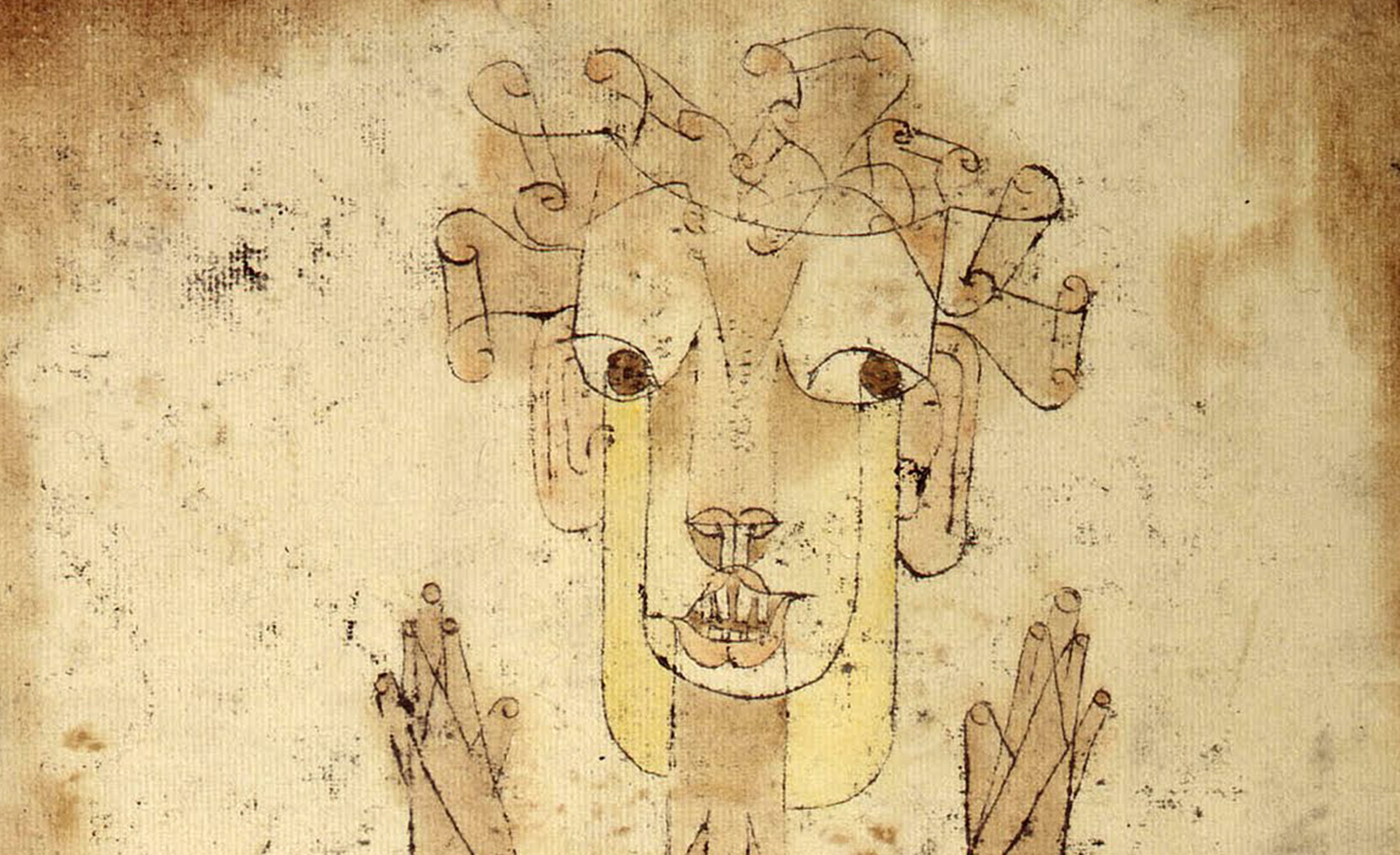What's the Reason for Hebrew's Mixed-Up Genders?
Quite a few masculine and feminine Hebrew words, when pluralized, take the form of the opposite gender. Why?

From “Angelus Novus” by Paul Klee, 1920.
“All inflected languages have irregularly declined nouns; that’s quite common. But I wonder if in Hebrew there is an idea that is embedded in particular irregularities. For instance, why is so essentially masculine a word as avot [fathers] pluralized in a feminine way, or so essentially feminine a word as nashim [women] pluralized in a masculine way? Is there a reason for this?”
The gender and the plural forms of Hebrew nouns, and the relation between the two things, can indeed be both puzzling and exasperating. The two examples cited demonstrate why. The Hebrew word for “father” is av and the Hebrew word for “woman” is ishah; the Hebrew masculine plural ending is –im and the feminine plural ending is –ot; logically speaking, therefore, “fathers” should be avim and “women” should be ishot. And yet, as Silver observes, it’s exactly the other way around. (The plural transformation of the first syllable of ishah from i- to na- is a different sort of anomaly that will be dealt with further on.) What’s going on? And why is it that these exceptions should occur precisely in words whose meanings actively include maleness and femaleness?
Gender itself can be unpredictable in most or all of the languages of which it is a central feature. (In many languages, such as English, it is of little or no importance.) Why is the sun, le soleil, masculine in French while the moon, la lune, is feminine? It cannot be because there is, to the human mind, something inherently male about the one and female about the other, because in German, die Sonne, the sun, is feminine and der Mond, the moon, is masculine. And although there are formal criteria that may determine the gender of French nouns—most ending with an “e,” like lune, are feminine while most ending with a consonant, like soleil, are masculine—there are plenty of counterexamples, such as feminine mer, sea, and masculine nuage, cloud. In both French and German, the gender of many nouns has no obvious relationship to their meaning, sound, or structure and must simply be learned, whether by the college student or the prattling infant.
Hebrew, which is even more heavily gendered than German or French, since its verbs also come in masculine and feminine forms, is no different in this respect. Although it does, like French and German, exhibit certain regular patterns, the gender of many of its nouns appears to be arbitrary. There is no discernible reason why a word like ḥerev, “sword,” should be feminine while its rhyme-word erev, “evening,” is masculine, or why tsinor, “pipe,” should be masculine when tsipor, “bird,” is feminine. Moreover, Hebrew nouns have an additional complication not found in French or German, which is that their plural forms are gendered, too. Thus, pluralized ḥerev. besides undergoing an internal vowel shift, takes the feminine suffix of –ot, so that “swords” is ḥaravot, while erev takes the masculine suffix of –im and “evenings” is aravim.
Brockelmann’s theory, stripped down here to its barest essentials, is but one; there are others. All have their strengths and weaknesses, their challengers and defenders; all draw their evidence from morphological and grammatical details in half-a-dozen or more Semitic languages, and none enjoys wide scholarly acceptance. Meanwhile, you’ll just have to learn these things by heart. And if you’re wondering what is the plural of the masculine Hebrew noun for “heart,” lev, it happens to be l’vavot.
https://mosaicmagazine.com/observation/arts-culture/2021/04/whats-the-reason-for-hebrews-mixed-up-genders/?utm_source=Daily%20Newsletter%20Segment&utm_medium=email&utm_campaign=Daily%20Newsletter%202021-04-28%20%28SrUEwy%29&_ke=eyJrbF9jb21wYW55X2lkIjogIkw4N0NHaCIsICJrbF9lbWFpbCI6ICJjZW9AZGlhbW9uZGNhcmQubmV0In0%3D
Shaddayim is masculine gender, and Beytzim is feminine gender.
ReplyDelete